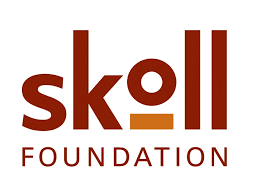Social entrepreneurs, new allies for governments, can help attain equitable, lasting change. Read a summary of the new report on the World Economic Forum Agenda, written by Diana Wells of Ashoka, Victor van Vuuren of International Labour Organization, François Bonnici of Schwab Foundation for Social Entrepreneurship, and Koen Vermeltfoort of McKinsey & Company.
One year into the COVID-19 pandemic, at a time when the attainment of the Sustainable Development Goals (SDGs) seem further out of reach, it is clear that the need to find, fund and support transformative solutions for the challenges we are facing has grown more urgent.
In January 2020, Ashoka and McKinsey, together with Echoing Green, Schwab Foundation, Skoll Foundation and Co-Impact joined forces with systemic social entrepreneurs, united under the Catalyst 2030 banner, to produce a report that framed their endeavours: Embracing Complexity: towards a shared understanding of funding systems change.
Building on that foundation, the New Allies report explores how governments can benefit from collaborating with systemic social entrepreneurs, and the measures they can take to foster that collaboration.
The need for this report is undeniable. With multiple compounding crises to navigate simultaneously, governments across the world are coming under increased pressure to deliver on the Sustainable Development Goals. It is equally clear that governments will find it increasingly challenging to realise the structural changes to existing societal systems that are urgently required without the support of systemic social entrepreneurs.
Systemic social entrepreneurs develop participative, people-centric solutions and deliver innovative approaches which can be a great complement to the macro-level perspectives of governments. Systemic social entrepreneurs can be defined as transformation guides for society. They are driven not by economic profit but by the desire to make a positive impact on the world and to find innovative solutions to unsolved challenges.
Below, watch a video of Nicolas Schmit, the European Commissioner for Jobs and Social Rights, endorsing the report.
Watch a recording of the New Allies report launch to hear Catalyst 2030 partners discuss the new research and report insights.
To start tackling this need, Ashoka and McKinsey invited additional partners to join their annual collaboration and co-create a shared perspective:
Ashoka
Ashoka is the global network for designers of our society who take an entrepreneurial stance and innovative approaches to solve social problems - in partnership with institutions and committed people worldwide.

Catalyst 2030
Catalyst 2030 is a collection of social entrepreneurs, intrapreneurs, corporations, independent individuals, civil societies and governments, who have all come together in an effort to answer a simple question with a very complicated answer: How can we ensure the United Nations Sustainable Development Goals are met by 2030?


Catalyst 2030
Catalyst 2030 is a collection of social entrepreneurs, intrapreneurs, corporations, independent individuals, civil societies and governments, who have all come together in an effort to answer a simple question with a very complicated answer: How can we ensure the United Nations Sustainable Development Goals are met by 2030?
Echoing Green
We discover emerging social entrepreneurs and invest deeply in the growth of their ideas and leadership. Over 30 years, we've built a broad, dynamic ecosystem to support these leaders as they solve the world’s biggest problems.

McKinsey & Company
A strategic consulting company, McKinsey & Company creates strategic missions and conducts evaluations of social impact studies for Ashoka and for Fellows around the world. McKinsey & Company also support Ashoka Fellows with personal consultations that will help launch and scale Fellows' strategy and impact.


McKinsey & Company
A strategic consulting company, McKinsey & Company creates strategic missions and conducts evaluations of social impact studies for Ashoka and for Fellows around the world. McKinsey & Company also support Ashoka Fellows with personal consultations that will help launch and scale Fellows' strategy and impact.
Schwab Foundation for Entrepreneurship
In partnership with the World Economic Forum, the Schwab Foundation for Social Entrepreneurship is a leading global platform that accelerates outstanding models of social innovation. Working together, we help scale solutions to support millions of vulnerable and low-income people in need.


Schwab Foundation for Entrepreneurship
In partnership with the World Economic Forum, the Schwab Foundation for Social Entrepreneurship is a leading global platform that accelerates outstanding models of social innovation. Working together, we help scale solutions to support millions of vulnerable and low-income people in need.

Governments can act in five areas to create supportive ecosystems that unlock the potential of systems social entrepreneurs
For each of these areas, this report outlines concrete recommendations and provides real-life examples of changes that governments around the world have implemented.
Principle 1:
Leverage the power of information by sharing and co-creating data.
Principle 2:
Build capabilities among civil servants and systems social entrepreneurs to enable mutual understanding and collaboration.
Principle 3:
Develop funding models that recognise the characteristics of systems social entrepreneurs.
Principle 4:
Promote collaboration between public sector organisations and between the public, private and social sectors.
Principle 5:
Foster institutionalisation by co-creating or adopting successful innovations.
Ashoka Staff Contacts
Please contact Konstanze Frischen for inquires within the United States.
Please contact Odin Muehlenbein for inquires within Europe.
Odin Mühlenbein
Systems Change, Ashoka Globalizer
Odin Mühlenbein is a Partner at Ashoka Germany and co-leads the Systems Unit at Ashoka Globalizer. Globalizer develops impact strategies for advanced social entretreneurs from around the world with the goal to promote social system change.
Before his job at Ashoka, Odin worked at McKinsey & Company and co-founded two social ventures that are now led by successors. He studied in Munich, Oxford, and Cambridge and holds degrees in Philosophy, Logic, and Political Sciences.







